| 上传:admin | 审核发布:admin | 更新时间:2015-3-31 15:30:03 | 点击次数:981次 |
www.ks5u.com
Unit 2 Working the land
I.教学内容分析
本单元以“农业”为中心话题,涉及了农村、农业产量、我国著名的杂交水稻专家袁隆平和有机农业等一些问题。
Warming Up部分通过3个问题和两幅图,使学生达到热身的效果。有些学生有过在农村生活经历,让他们简短地讲出来,与其他同学一起分享,一起了解一些有关农业的知识。因为这部分的问题,对于农村的孩子,他们有生活,就有话说;对于城市里的孩子来说,有新鲜感,所以能比较容易调动起学生的积极性。
Pre-reading部分以水稻这种农作物为主设计了三个问题,这三个递进式问题的设计,力图激发学生已有的知识和经验,发挥学生的想象力来更好地理解课文。另外,还可以激发学生的同情心和人道主义精神。
Reading部分是对一位伟大的科学家——“杂交水稻之父”袁隆平的介绍。本文通过介绍他的家庭背景、学业、科研成就、无私品质、和普通人一样的生活,使一位普通、朴实又务实的中国农业科学家形象活生生地展现在学生面前。
Comprehending部分设置了四个练习,主要用来帮助学生更好地理解阅读课文的内容。
Learning about Language部分帮助理解本单元重点词汇和语法。本单元的语法是动词-ing形式作主语和宾语。
Using Language部分综合训练学生的听说读写能力。本部分紧扣本单元的话题,讲到了什么是有机农业、有机农业的好处和有机农业在农作物种类选择方面的具体做法。其中写作部分使学生复习了如何表达建议并学习怎样用英语设计食品小广告,突出了实用性。
Summing Up部分让学生对本单元所学的知识进行归纳。
Learning Tip指导学生在写作或会话过程中记笔记,使学生讲话或写作时条理清晰,层次分明。
II.教学重点和难点
1. 教学重点
(1) 本单元有关农业的词汇和短语;
(2) 本单元的语法:动词-ing 形式作主语和宾语;
(3) 了解农业,提倡绿色农业,学习袁隆平的无私、务实品质。
2. 教学难点
(1) 认识绿色农业,克服传统农业思想,向科学家学习,以提高自身的素质;
(2) 学会提出自己的理由说服别人;
(3) 学会设计小广告。
III.教学计划
本单元建议分六个课时:
第一课时:Warming up, Listening (Workbook) & Talking (Workbook)
第二、三课时:Pre-reading, Reading & Comprehending
第四课时:Learning about Language
第五课时:Reading (Using Language) & Reading task (Workbook)
第六课时:Listening (Using Language), Listening task (Workbook) & Reading, speaking and writing (Using Language)
IV.教学步骤:
Period 1 Warming up, Listening (Workbook) & Talking (Workbook)
Teaching Goals:
1. To arouse Ss’ interest in learning about farming.
2. To develop Ss’ speaking ability.
Teaching Procedures:
Step 1. Leading-in
Purpose: To activate Ss and arouse them to say some words about farming.
To lead Ss to the topic of this unit through the questions.
1. Show the pictures about the country life.

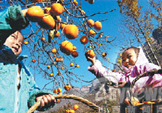
2. Ask Ss the following questions and then present their views to all classmates
(1) Who is from countryside?
(2) Who has the experience of going to the countryside?
(3) What did you do there?
(4) How is the farmer’s life there?
(3) How much do you know about farming?
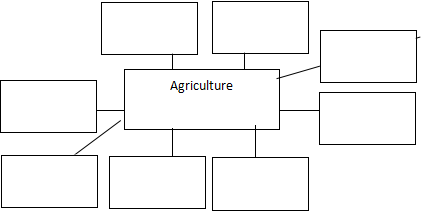 3. Encourage Ss to give five or six words that are used to describe agriculture.
3. Encourage Ss to give five or six words that are used to describe agriculture.
Suggested Answer :
:
Step 2. Pre-listening
Purpose: To help Ss learn about the context of the listening text.
1. Ask Ss to discuss with their partners in groups of four according to the picture.
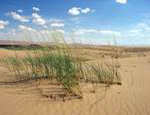
(1) Is it farmland or desert?
(2) Can farmland become a desert?
(3) How can humans change a desert back into farmland?
2. After the discussion, ask Ss to present their opinions to all classmates.
Step 3. Listening (Workbook)
Purpose: To get the main information in the listening part.
To develop Ss’ listening ability
To learn some information about agriculture in desert.
1. Ask Ss to listen to the tape, focus on the stages of turning fertile land into a desert and then finish Ex1 on P48.
2. Ask Ss to listen to the tape again and finish the Ex2 on P48.
|
May I suggest…? Let me suggest…because… But what/how about…? Perhaps we should consider…because… I would rather… It’s better to… If I have a choice I’d choose… Don’t you think… should… If… it would be fair. In my opinion…
|
Step 4. Homework
1. Ask Ss to read the new words and expressions on P96.
2. Ask Ss to prepare a dialogue to persuade people to agree with you on choosing someone as your favorite.
Periods 2 & 3 Pre-reading, Reading & Comprehending
Teaching Goals:
1. To learn about Yuan Longping.
2. To develop Ss’ some basic reading skills.
3. To arouse Ss’ interest in learning about agriculture, the reading text and Professor Yuan’s quality.
Teaching Procedures:
Step 1. Pre-reading
Purpose: To arouse Ss’ interest in learning about Yuan longping.
1. Show some pictures, and encourage Ss to give as much information as possible.

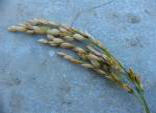

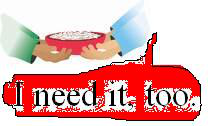
2. Let Ss work in pairs to discuss the following questions.
(1)Do you think there is enough rice to eat in the world now? What if tomorrow there was suddenly no rice enough to eat?
(2)What would you do to end hunger if many people go hungry in the world as showed in the 4th picture?.
Step 2. Leading-in
Purpose: To arouse Ss’ interest in the text and encourage Ss to imagine the content of the text.
1. Ask Ss to answer the questions below.
(1) Who is the person in the picture?
(2) Can you guess what his job is?
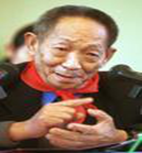
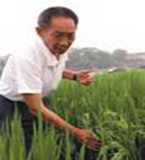
2. Ask Ss to talk about Yuan longping according to what they know.
Step 3. Fast reading
Purpose: To get a brief understanding of the text.
1. Ask Ss to read the text quickly and try to get the main idea of the text.
2. Ask Ss to get the main idea of each paragraph and complete the following form.
|
Paragraphs |
Hints |
|
1 |
|
|
2 |
|
|
3 |
|
|
4 |
|
Suggested Answers:
|
Paragraphs |
Hints |
|
1 |
① The scientist’s appearance ② His achievement—super hybrid rice. |
|
2 |
① Yuan’s family background ② His agricultural research |
|
3 |
Yuan’s noble personality. |
|
4 |
Yuan’s dreams. |
Step 4. Intensive reading
Purpose: To get Ss to have some details in the text.
1. Ask Ss to read the text carefully and work in pairs to finish Ex1 of Comprehending on P11.
2. Ask Ss to take the quiz below and see whether Ss can grasp the details of the text.
(1) Why does Yuan want everyone to call him a farmer?
A. Because he is one of China’s most famous scientists.
B. Because he works the land to do his research.
C. Because his sunburnt face and arms and his slim, strong body are just like those of millions of other Chinese farmers.
D. Because he thinks of himself as a farmer.
(2) The second paragraph tells us that nearly _____million tons of rice was produced by Chinese farmers last year.
A. 200 B. 50 C.20 D 500
(3) Thanks to his research, farmers are producing harvest ____ as large as before.
A. 22%
B. twice
C. 7%
D. four times
(4) Dr Yuan still has the following hobbies except_____ in his spare time now.
A. Playing the violin.
B. Playing mah-jong.
C. Swimming
D. Reading.
(5) How does professor Yuan feel about money?
A. Money is the most important in his life.
B. Too much money can bring more happiness rather than troubles.
C. Money is nothing.
D. He cares little about the money spent on himself.
(6) What was not once in Professor Yuan’s dream?
A. Rice was as tall as sorghum.
B. Each ear of rice was as big as an ear of corn.
C. Each grain of rice was as huge as a peanut.
D. He exported his rice and it was grown all over the world.
Suggested Answers:
(1) D (2) A (3) B (4) A (5) D (6) D
Step 5. Language point
Purpose: To train Ss’ listening ability and language capacity.
1. Ask Ss to listen to the tape and follow it in a low voice.
2. Divided Ss into four groups. Each group is supposed to read through each part, and then find the following phrases.
Group one:
|
do one’s research in many ways struggle for the past five decades the first agricultural pioneer makes it possible to do something hybrid strain |
Group two:
|
graduate from Southwest Agriculture College devote his life to as a young man search for circulating his knowledge less developed countries thanks to get rid of |
Group three:
|
be satisfied with cares little about lead a comfortable life rather than equip somebody would rather prefer to do something twice as large as |
Group four:
|
wish for things with the hope of cares for people |
3. Ask Ss to find following sentences and try to explain them in English. Let them pay more attention to the underlined part of each sentence.
(1) He wants everyone to call him a farmer, for that’s how he regards himself.
(2) In many ways, he is one of them, and he has struggled for the past five decades to help them.
(3) At that time, hunger was a serious problem in many parts of the countryside.
(4) Using his hybrid rice farmers are producing harvests twice as large as before.
(5) Wishing for things, however, costs nothing.
Suggested Answers:
(1) It means he thinks of himself as a farmer but other people may think of him as a famous scientist or a rich man.
(2) It means he does not only look like a farmer but also he works in the fields with farmers. In fact, he does scientific research for them.
(3) It means that many people were very hungry and they even became ill and died because there was not enough food.
(4) It means that farmers growing his rice species are producing rice twice as much as they did in the past.
(5) It means that dreams are free and everybody can have ideas about what they would like their future life to be.
Step 6. Retelling
Purpose: To train Ss’ memory.
To improve Ss’ ability of retelling.
1. Encourage Ss to use some important words and phrases to retell the text.
|
do one’s research in many ways struggle for the past five decades the first agricultural pioneer makes it possible to do something hybrid strain graduate from Southwest Agriculture College devote his life to as a young man search for circulating his knowledge less developed countries thanks to get rid of be satisfied with cares little about lead a comfortable life rather than equip somebody would rather prefer to do something twice as large as wish for things with the hope of cares for people
|
2. Ask some Ss to present their retold story before the class.
Step 7. Discussion
Ask Ss to discuss the following questions with their partners and give their own opinion.
1. What reason made Dr Yuan want to increase the rice output when he was young?
2. How does he help rid the world of hunger?
3. Does Dr Yuan live a rich life because of his research?
4. What should we learn from Dr Yuan’s personality?
Suggested Answers:
1. Dr Yuan wanted to increase the rice output because he saw many people go hungry when he was young.
2. He helps the world get rid of hunger by producing a hybrid strain of rice which increases the harvest.
3. No, he doesn’t live a rich life, instead ,Dr Yuan is leading a simple life, doing his research, listening to his music and riding his motor-bike.
4. Dr Yuan is a simple, academic man who is more interested in helping others than being famous. We should learn from him to be unselfish.
Step 8. Homework
1. Ask Ss to make sentences with the following phrases.
|
make it possible to do graduate from thanks to be satisfied with care about would rather do than do with the hope of live a… life devote one’s life to twice as large as |
2. Ask Ss to write a short composition about the pioneer Yuan Longping.
Period 4 Learning about Language
Teaching Goals:
1 To enable Ss to master some new words and expressions.
2. To get Ss to have knowledge of this grammar point: The –ing form as the subject & object)
Teaching Procedures:
Step 1. Revision
Purpose: To consolidate the words and phrases in the text.
1. Ask Ss to find words and expressions that mean the same from the text and finish Ex1on page 12..
2. Ask Ss to finish Ex2 on page 12.
3.Ask Ss to finish Ex3 on page 12 ,and compare their answers quickly.
Step 2. Grammar
Purpose: To get Ss to have knowledge of the grammar: the –ing form as the subject & object
Explain the grammar for Ss.
-ing形式是动词的一种非限定形式,本单元主要介绍的用法如下:
(1)它们都有名词的特征,在句子中可以用作主语。如:
Using his hybrid rice farmers are producing harvests twice as large as before.
Wishing for things, however, costs nothing.
(2)也可以作为宾语。如:
His other hobbies include playing mah-jiong, swimming and reading.
He also doesn’t care about being famous.
(3)同时,动词的-ing 形式也有动词的特征,可以带有自己的宾语或状语。如:
As a young man, he saw the great need for increasing the rice output.
However, he cares little about spending the money on himself or leading a comfortable life.
I don’t like people talking when I am reading.
(4)-ing 形式作主语时,谓语动词要用单数形式。如:
Chatting with them improves our mind.
Quarrelling is no use.
Step 3. Consolidation
1. Ask Ss to rewrite the sentences using the –ing form as the subject in Ex2 on P13
2. Ask Ss to finish Ex3 on P13 in pairs and compare their answers.
3. Explain the following grammar point.
有些动词只能用-ing 形式作宾语。如:
Admit(承认), advise(建议), allow(允许), appreciate(感激), avoid(避免) , complete(完成) consider(考虑),delay(延期),deny(否认),enjoy(享受), escape(逃避),finish(完成),imagine(想象),keep(保持),mind(介意),miss(错过), postpone(延期),practice(练习), quit(停止), suggest(建议),stop(停止)等。.
4.Divide Ss into groups of four to take turns to describe an activity. Be sure to use the –ing form of the verb. The game is called “what were you doing when the flood came?”
Example: S1: I was collecting water for my family instead of watching TV.
S2: I was preparing some food for eating when I was hungry.
S3: I was carrying vegetables to the market which was good place for exchanging.
S4: I was building a dam which was used for holding much more water.
More Versions:
(1) What were you doing last night?
S1: I was chatting with my e-pal about traveling into space.
S2: I was watching a TV programme which was good for relaxing.
S3: I was playing a computer game which was about killing enemies.
S4: I was listening to music while my sister was absorbed in reading a novel.
(2) What were you doing when the earthquake came?
S1: I was feeding geese although I was tired of doing it.
S2: I was looking after the child who liked only playing.
S3: I was working in the garden which was famous for growing roses.
S4: I was watering the plant which needed caring.
Step 4. Homework
Purpose: To get Ss to have knowledge of the grammar through exercises.
To enable Ss to practice some new words and expressions.
1. Ask Ss to finish Ex1 and Ex2 of Using Words And Expressions on P49.
2. Ask Ss to finish Ex1 and Ex2 of Using Structures on P50.
Period 5 Reading (Using Language) & Reading task (Workbook)
Teaching Goals:
1. To get Ss to learn what organic farming is.
2. To get Ss to know the advantages of organic farming.
Teaching Procedures:
Step 1. Leading-in
Purpose: To lead Ss to the topic and arouse the Ss’ interest in the reading text.
1. Ask Ss to look at the picture on P14 and guess what the passage is bout.
2. Ask Ss to discuss the following questions.
(1) What do you refer to when you say something is “Green food”?
(2) What is organic farming?
(3) What’s your idea? Encourage Ss to use a variety of words.
Step 2. Reading
Purpose: To learn more about agriculture.
(1) Ask Ss to read the text quickly and try to get the main idea of the text.
(2) Ask Ss to discuss the questions and then answer them in pairs.
① What is “organic farming”?
② What do organic farmers prefer to use as fertilizer?
Suggested Answers:
① It refers to crops growing with natural rather than chemical fertilizers.
② The fertilizer that organic farmers prefer is natural waste from animals.
Step 5. Reading task (Workbook)
1. Pre-reading
(1) Lead Ss to the reading text. Teacher may say, “Now you are going to read about another farmer, an early farmer pioneer. You have learned some Chinese history. Perhaps you know something about Qi Min Yao Shu, what is it ?
(2) Show the picture of the author of the book and encourage Ss to talk as much as possible.

2. Reading
![]() Ask Ss to read the text quickly and answer the following questions.
Ask Ss to read the text quickly and answer the following questions.
(1) Why did Jia Sixie become interested in farming improving?
(2) Can the book help farmers?
![]() Ask Ss to read the text carefully and finish Ex2 on P52.
Ask Ss to read the text carefully and finish Ex2 on P52.
3. Discussion
(1) Divide Ss into groups of four to discuss the questions.
1Why do we support the organic farming?
2Why did Jian Sixie write the book Qi Min Yao Shu?
(2) Let Ss use the skills they have learned about expressing points of view and express their ideas in good order.
For reference:
|
We support the organic farming. Firstly… Secondly…Thirdly… Finally…
|
(3) After the discussion, ask representatives of each group to present the result of the discussion.
Step 6. Homework
1 Ask Ss to finish Ex3 on P49.
2 Ask Ss to form two groups and surf the Internet to collect more information about green farming in China and abroad.
Period 6 Listening (Using Language), Listening task (Workbook) & Reading, speaking and writing (Using Language)
Teaching Goals:
1. To develop Ss’ listening, speaking and writing ability.
2. To realize the practical benefits of green farming methods and the advantages of “green food”.
Teaching Procedures:
Step 1. Listening (Using Language)
1. Ask Ss to discuss the following questions with their partners in groups of four and try to predict the answers.
(1) What will be the result if Mr. Jones uses chemical fertilizers in farming?
(2) What will be the result if Mr. Smith uses organic farming ?
(3) Who will win if they take a competition when it is harvest time?
2. Ask Ss to listen to the tape and finish Ex2 of Listening on P15.
Step 2. Listening task (Workbook)
1. Ask Ss to Look at the map of the world and guess the farming situations in the following places.
2. Ask Ss to Listen to the tape and match the descriptions with the right sites in the map.
3. Play the tape again for Ss to check their answers.
Step 3. Reading, speaking and writing (Using Language)
1. Ask the two groups of Ss to present their information downloaded form the Internet (homework in the last period) and make notes (try to make it in good order, and it is better to mark the facts with number).
2. Let Ss read the Learning tip on P16 and make sure they grasp the main idea of the paragraph. And encourage Ss to use notes in writing or speaking.
3. Ask Ss to read the content of Ex1 of Reading, speaking and writing on P15 and consider what will be used to persuade others.
Possible expressions:
|
I would rather… I don’t like… because… I’d prefer… because… It’s a great pity that ------ Should I/we…? It’s better to… This is good value because… If I have a choice I’d choose… because… What is the advantage of…? You need to…
|
4. Ask Ss to work in pairs and find reasons to persuade people to buy their food.
One Possible Version:
If I have a choice, I’d choose this kind of vegetables because they are green food. The advantages of them are that they are safe to eat and they are good for your family. It is better to feed you family on green food than other vegetables because they are grown without chemical fertilizers. They are good value for the money, because you will have healthier children. They will not have to go to the doctor so often and you will not have to take time off work. In the long run you will benefit.
5. Tell something useful for Ss to write a poster.
(1) When writing a poster one should shorten the sentences. For example:
① There have been no chemical fertilizers used to grow these crops
![]()
 no chemical fertilizer used.
no chemical fertilizer used.
② if you want to be healthier and fitter you should ear “green food”.
![]() Eat “green food” to become healthy.
Eat “green food” to become healthy.
(2). A common form of a poster.
|
Main heading This explains that you sell green food. Reasons to buy: 1.(one reason) 2.(one reason) 3.(one reason) 4.(one reason) Why it is good value. |
3. Ask Ss to write a poster which includes all the information about the safety and importance of their food. Then let them share their writings with the class by reading their posters aloud.
Step 4. Homework
Let Ss choose one from the following assignments.
1. Write a short summary about Yuan Longping.
2. Write a short passage to persuade others to buy your bananas.
3. Write a poster to sell your fresh fish.

通讯地址: 广州市天河区东圃黄村龙怡苑 (510660)邮箱:lzm6308@163.com 联系QQ:534386438
Copyright © 2008-2012 klxkc.com All Rights Reserved. 粤ICP备15026984号-1
